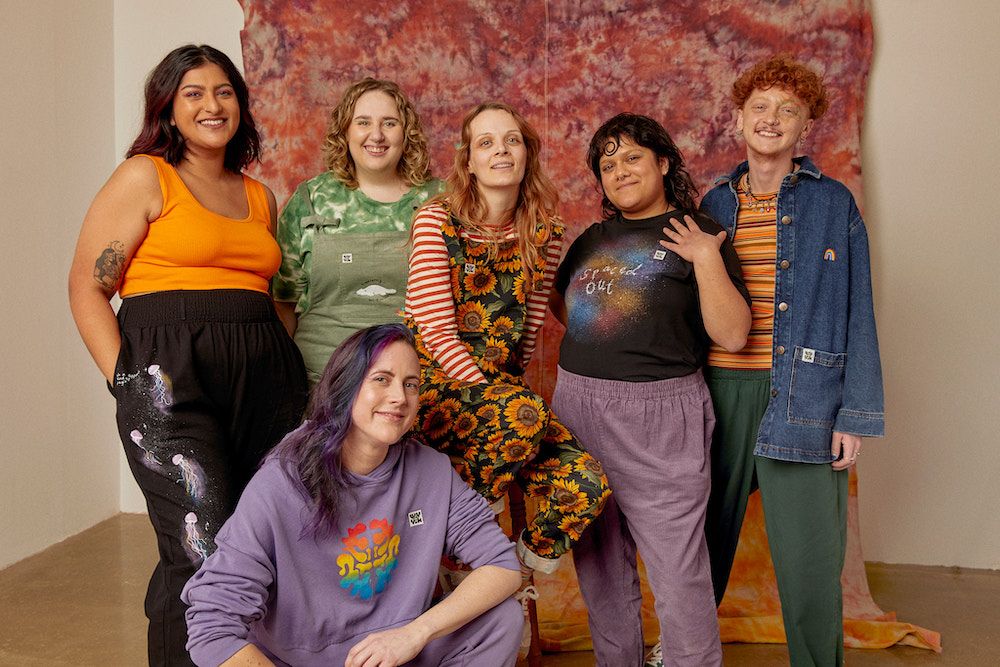From the stores stepping up for inclusivity to a major change to official language that challenges the way we think about women's bodies, discover the good news stories full of hope
Store introduces quiet times for neurodiverse shoppers
Shopping can feel very overwhelming for some neurodivergent people. But sustainable clothing brand Lucy & Yak may have a solution.
Looking to celebrate neurodivergent customer experiences, Lucy & Yak’s ‘Everybody & Everymind’ campaign is a collection of comfy, inclusive, and colourful clothes that feel good and resonate with the community – as well as a promise to serve its neurodivergent customers in a way that suits them.
On the 17th of every month, each store is updated to create an inviting shopping atmosphere for neurodivergent customers. Quiet music, lower levels of lighting, and a limited number of shoppers, provide a more relaxing space. There are also optional stickers which flag to staff members which customers would prefer to shop in peace, rather than be approached.
The illustrations for the Everybody & Everymind clothing collection also take notes from the neurodiverse experience, including the ‘Temporarily out of service’ pattern, which draws inspiration from the feeling of autistic burnout, and ‘Spaced out’ which refers to the common ADHD experience of ‘zoning out’, where the brain involuntarily gets pulled away from the task at hand. Each has been designed to help customers feel seen and celebrated, shifting focus towards the many positive aspects of being neurodivergent. In the words of Lucy & Yak: “This difference is something to celebrate!”

Photogprahy | Polly Hanrahan
Turning pages on new forms of escapism
We all have those days when everything seems to go wrong, and we feel like we just can’t catch a break. Sometimes all we want to do is escape from reality and forget about our worries, just for a little bit. While there are many ways to do this, a new study suggests that one of the best forms of escapism is through reading.
The Publishers Association surveyed more than 2,200 adults in the UK, and found that a third of people (33%) believe that books offer the best form of escapism when you’re having a bad day, coming second to watching TV (54%). Meanwhile, streaming services, looking at social media, listening to the radio, and going to the pub or cinema, proved to be less popular choices.
It’s hardly surprising that reading is favoured by so many. When we immerse ourselves in a book, we are transported to different worlds and are introduced to new characters and ideas. We can lose ourselves in a story and forget about our own problems for a while, which can be incredibly soothing and restorative when we’re feeling anxious or overwhelmed.
Considering the survey, Dan Conway, CEO of the Publishers Association, said: “Books are a great way for us all to escape from our everyday routines, and if we are able to share that with our friends, families, and more widely, we could be making a huge difference to people’s lives without even realising it.”
So, if you find yourself facing one of those days today, pick up a book (or a copy of Happiful!) and lose yourself in a world that awaits within the pages.
NHS retires outdated gynaecological term
Language matters, particularly when it comes to talking about sensitive health topics. And yet, in some areas of health, outdated ways of speaking about procedures have prevailed. But, following campaigning from the gynaecological cancer charity the Lady Garden Foundation, one such term has finally been put to rest, for good.
Until recently, patients attending their cervical screening may have been offered a ‘virgin’ speculum – a common name for an extra small speculum. As the Lady Garden Foundation saw it, this unnecessary (and nonsensical) sexualisation of a piece of medical equipment was part of a culture that discouraged women from attending cervical screenings – with recent NHS figures showing that attendance is actually at a 10-year low.
But now, after successful campaigning, the NHS Supply Chain framework plans to amend product descriptions, and will go on to work with any remaining suppliers to eradicate the use of the word ‘virgin’ in all literature, communication, and websites by 2025.
Speaking of the victory, broadcaster and female health advocate Davina McCall said: “I am overjoyed to hear that the brilliant Lady Garden Foundation has been successful in its call to rename the ‘virgin’ speculum. I am continuously working to ensure that women are able to receive gynaecological treatment with confidence, and the life-saving act of going to a cervical screening should never be sexualised.”
For more information, head to nhs.uk/conditions/cervical-screening

The British Sign Language GCSE is coming…
The much anticipated British Sign Language (BSL) GCSE is verging on reality, with the government initiating a consultation to determine the content.
Involving people from the deaf and hearing communities, as well as schools and employers, consultees will be asked what should be taught as part of the criteria, making sure it’s accepted in performance tables.
Introducing the GCSE is a quantum leap in supporting equality and inclusivity within education. Students will learn how to communicate around 1,000 signs, using them to express meaning with other signers in work and social settings. Being able to produce these signs accurately and take part in conversations will benefit students for their entire lives – a crucial life skill valued by future employers, but also breaks down walls for deaf people using BSL.
The Department for Education aims for the GCSE to be taught from September 2025; any pupil can take the course, and no prior experience will be required. Education Secretary Gillian Keegan believes the new qualification will be a way to “advance equality of opportunity and celebrate the history and rich culture of British Sign Language”.
The move is partly driven by 17-year-old Daniel Jillings’s five-year crusade. Motivated by injustice, he has persistently campaigned for deaf people to achieve a GCSE in their native language, which provides an excellent reminder to pursue our passions in a way that serves the greater good.


Comments